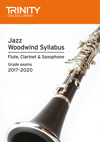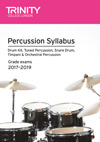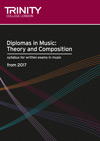Four new Trinity music syllabuses are now available to download:
 |
1. Woodwind grades syllabus (2017-2020) Our new woodwind grades syllabus contains requirements for flute, clarinet, oboe, bassoon, saxophone and recorder. Repertoire lists have been updated for all instruments, and for the first time pre-Grade 1 Initial exams are available for flute and clarinet players. Technical work for oboe, bassoon and recorder has been revised, with changes to scales & arpeggios and brand new exercises for Grades 1-5. The new syllabus is supported for the first time by graded repertoire books and audio recordings for flute and clarinet (Initial to Grade 8). Each book contains nine pieces (six accompanied pieces for group A and three unaccompanied pieces for group B), covering a wide spectrum of styles and genres. Additionally, new technical work books are available for oboe, bassoon and recorder, containing all scale and arpeggio requirements for Grades 1-8 along with six newly commissioned exercises at each of Grades 1-5: candidates may prepare three of these and perform two in their exam as an alternative to scales and arpeggios. The technical work books for flute, clarinet and saxophone released with the 2015-2016 syllabus remain valid. A one year overlap arrangement will be in place, so candidates may perform repertoire and technical work from the current syllabus until the end of 2017. NB there is no overlap for supporting tests, so the current aural and improvisation tests cannot be offered after 31 December 2016. Please visit the Woodwind and jazz woodwind page for full details. |
 |
2. Jazz woodwind grades syllabus (2017-2020) Covering Grades 1-8, the new jazz woodwind syllabus outlines the requirements for jazz flute, jazz clarinet and jazz saxophone exams. Following a wide-ranging revision of the repertoire lists and technical work in 2015, this syllabus features a further refresh to the repertoire lists, including an increase in the number of jazz standards in response to feedback from teachers. A one year overlap arrangement will be in place, so candidates may perform repertoire and technical work from the current syllabus until the end of 2017. NB there is no overlap for supporting tests, so the current aural and improvisation tests cannot be offered after 31 December 2016. Please visit the Woodwind and jazz woodwind page for full details. |
 |
3. Percussion grades syllabus (2017-2019) The new percussion syllabus includes requirements for Grades 1-8 exams in drum kit, tuned percussion, snare drum, timpani and orchestral percussion. Requirements remain largely unchanged from the previous syllabus, apart from the addition of an option to perform an own composition in place of one of the prescribed pieces. NB There is no overlap as this syllabus has not changed significantly, so the 2014-2016 syllabus will not be valid after 31 December 2016. Please visit the Percussion page for full details. |
 |
4. Theory and composition diplomas syllabus (from 2017) This syllabus covers the various written diplomas in music offered by Trinity: three levels of theory diplomas (AMusTCL, LMusTCL and FMusTCL) and two levels of composition diplomas (LTCL and FTCL). The AMusTCL and LMusTCL theory diplomas have been substantially revised. The AMusTCL section C (stylistic awareness) has been discontinued, and the set works in section B now relate to the historical periods studied in section A, producing a more cohesive structure. The format is also now more flexible, with candidates able to answer any five questions (including at least one from each section). A new musical skills component features in the restructured LMusTCL, resulting in a more logical progression from AMusTCL. Sample papers for the new AMusTCL and LMusTCL are available for free download from the Theory and composition diplomas page. Unit 2 of the LTCL Music Composition, previously a written exam, now takes the form of a submitted portfolio. This revision allows the diploma to focus purely on composition, and aligns the format with that of the FTCL Music Composition. NB There is no overlap, so the 2009 syllabus may not be used after 31 December 2016. Please visit the Theory and composition diplomas page for full details. |